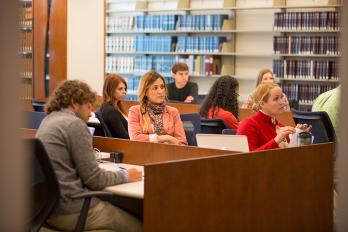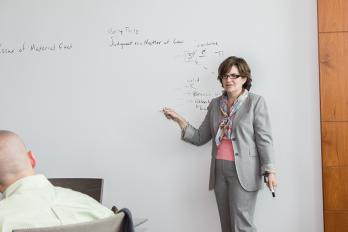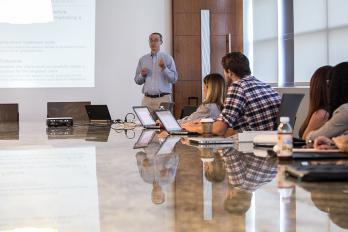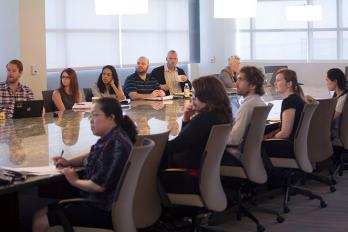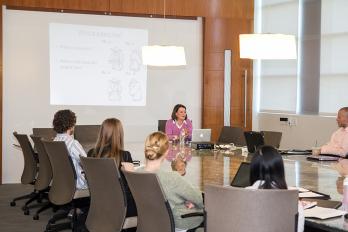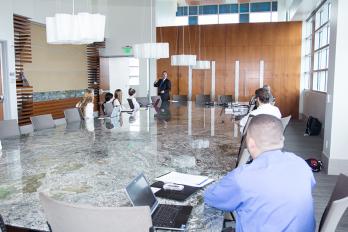TJSL’s IP Practicum Program is a Major Success
June 14, 2013
Thomas Jefferson School of Law’s groundbreaking IP Practicum has just completed its first three-week run and has been a major success.
The Practicum centered on a fictitious law firm called “Thomas & Jefferson” that specialized in intellectual property law (IP). The partners were faculty and staff members – the associates are TJSL students.
During the program, the summer associate students explored the role of intellectual property law in technology-driven companies as well as entertainment and sports settings.
The Practicum is a brand-new model – a new way of teaching, using hands-on experience.
Rather than take traditional classes, the summer associates received assignments from the program’s experienced partners, who supervised and reviewed their work, as well as attending regular Continuing Legal Education-style (CLE) classes on all aspects of IP law.
“We were hoping that in this very concentrated setting students would not only get a feel for the different fields that are employed in practice, but also that they would get a sense of what it was like to figure things out on their own,” said TJSL faculty member Professor Julie Cromer Young a “partner” in the Thomas & Jefferson mock firm. She who co-designed the Practicum with Adjunct Professor Eric Lane and Professor Steve Semeraro.
“The traditional model of legal education involved a period of apprenticeship during which a young lawyer learned by working for a more experienced practitioner,” said Professor Steve Semeraro, one of the “partners” in the IP Practicum law firm. “Until recently, that role was often filled by law firms that took on the task of training young lawyers to actually practice law. Since the economic downtown, however, firms have hired fewer young lawyers, thus abdicating this important responsibility to the bar. Many commentators and the ABA have called upon law schools to fill the void by adopting more practical training classes. And they have through traditional skills training, clinics, and externships. The central idea behind the IP Practicum is that there was value in the apprenticeship tradition that is not captured through classes and clinics. Managing a caseload and reporting to a partner mentor creates a fruitful learning dynamic. The Practicum thus offers students the chance to learn by working in a mock law firm, ‘Thomas & Jefferson,’ in which their professors play the role of partners providing a series of assignments through an intensive three week program.”
The timing of the IP practicum couldn’t be more opportune – it coincides with a new draft proposal from the California State Bar Task Force on Admissions Regulation Reform recommending new competency skills training requirements for newly admitted lawyers that are designed to improve their readiness to practice law. One of those recommendations would require that students complete 15 hours of competency skills training during law school.
“The IP Practicum is definitely a step in that direction,” said Professor Cromer Young. “We are ahead of the curve.”
According to Adjunct Professor Eric Lane, “I think the Practicum opens the opportunity for experience, particularly in IP, to more students who are not able to participate in the clinics due to limited enrollment.” He also notes that only a small percentage of law schools have IP clinics. “The Practicum model can be implemented much more easily and widely because it does not have the administrative/certification requirements of the clinics,” Professor Lane added.
Among the firm’s “partners,” were TJSL Professors K.J. Greene, Brenda Simon and Jeff Slattery who gave CLE lectures as did Tim Dennison, Randy Berholtz, and Randy Grossman from the adjunct faculty. Other adjuncts who participated were Professors Judybeth Tropp and Lilys McCoy, and Associate Admissions Director Justin Cruz.
The IP Practicum offered at TJSL is loaded with opportunities to learn the valuable tools necessary for today’s successful IP attorney and the students who have been participating in the IP Practicum say it has been a valuable experience.
Arthur Moreau (2L) is an IP Fellow and who wants to get as much experience as possible while here at Thomas Jefferson. “The practicum seemed like a great way to get some real legal work experience,” Moreau said. “The Practicum has been great. It has really given me a first-hand account of what it is going to be like to work in a firm as an associate. I believe that the practicum has really picked up where my legal writing classes left off, and has given me a great deal of practical experience that I will be able to transfer into my internships and future employment. I would highly recommend the program to anyone interested in the IP field.”
Moreau would like to work in the cross sections for the intellectual property and entertainment fields, and eventually would like to end up in Los Angeles.
Katie Macfarlane (3L) said, “As a part-time student who works full time, a summer internship is not a possibility for me at this point. Due to the length of time of the IP Practicum (3 weeks) this was something I could arrange with my employer to be able to attend and gave me the next best thing to an actual internship. The best take away from the IP Practicum so far is the practical application. Before this course, I had never written a cease and desist letter, office action, or motion for summary judgment. I also was able to navigate the USPTO website and put that to practical use as well by filing a trademark intent to use application.”
Macfarlane, who has a technical background, plans to study for the patent bar the rest of the summer.
“The IP Practicum has been an incredible experience,” said Chanel DiBlasi (2L). “I feel prepared to start my internship on Monday. Three weeks ago I was very nervous about my internship. But I have learned so much in the IP Practicum (in preparation for my internship,) that I am confident I will do well. My writing skills have greatly improved. This class is everything that I wanted it to be. I walk away from this class feeling as though I can really make it in this profession. “
Daniel Laipply (2L) says he was motivated to take the IP Practicum because “I felt it was an incredibly unique opportunity to experience the demands of a summer associate position, while also having the benefit of the program being educationally based. I felt that in completing the Practicum I would learn what to expect from a summer associate position, learn how to better balance my time in order to be prepared for a summer associate position, and strengthen my writing and research skills.”
Laipply, who hopes to practice IP at a medium or large firm after graduation, added, “The Practicum has been the single most influential experience of my educational career. As a summer associate at Thomas & Jefferson LLP. I have learned the practical skills necessary to meet the demands of a summer associate position, while also dramatically increasing my ability to quickly, efficiently, and accurately address multiple legal issues at one time. Additionally, my ability to perform when challenged with a heavy workload has greatly increased, thereby increasing my personal level of self confidence in legal work.”
Derek Midkiff (3L), who is a registered patent agent and an Intellectual Property Fellow, said: “The program was a really great experience. It was a really great overview of everything IP entails from IP valuation and management to trade secrets and patents. It gave me more legal writing experience as well as writing letters and memos to clients. I am really impressed with the class, namely the excellent guest speakers they were able to bring in every day.”
“Our goal was that the students would feel a little more confident and have that practice type experience and practice type work product in a very short period of time,” said Professor Cromer Young.
